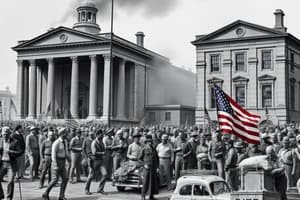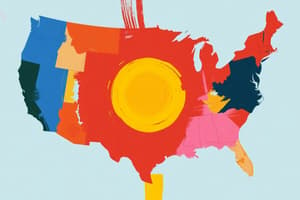Podcast
Questions and Answers
What key societal impact did the Industrial Revolution have on American society?
What key societal impact did the Industrial Revolution have on American society?
- It led to the abolition of all forms of labor.
- It resulted in decreased urbanization and fewer jobs.
- It isolated the United States from global trade.
- It created new social classes and significant challenges. (correct)
Which event is associated with the expansion of U.S. territory in the 19th century?
Which event is associated with the expansion of U.S. territory in the 19th century?
- The Civil Rights Movement
- The abolition of slavery
- The Gilded Age
- The Louisiana Purchase (correct)
What was a central outcome of the Progressive Era in American society?
What was a central outcome of the Progressive Era in American society?
- It caused an increase in corruption in politics.
- It led to the reversal of industrialization.
- It initiated widespread social and political reforms. (correct)
- It eliminated all economic inequality.
How did the Great Depression influence the role of government in the economy?
How did the Great Depression influence the role of government in the economy?
Which leader is best known for their role in the Civil Rights Movement?
Which leader is best known for their role in the Civil Rights Movement?
Which factor was NOT a motivation for the founding of the thirteen British colonies?
Which factor was NOT a motivation for the founding of the thirteen British colonies?
Which event marked a significant shift in the relationship between the colonies and Great Britain?
Which event marked a significant shift in the relationship between the colonies and Great Britain?
What was a major consequence of the Federalist and Anti-Federalist debates?
What was a major consequence of the Federalist and Anti-Federalist debates?
Which theme focuses on the evolution of American cultural and moral standards over time?
Which theme focuses on the evolution of American cultural and moral standards over time?
How did westward expansion during the 19th century primarily impact Native Americans?
How did westward expansion during the 19th century primarily impact Native Americans?
Which of the following best describes the primary challenge faced by the early republic?
Which of the following best describes the primary challenge faced by the early republic?
Which of the following issues was NOT a major focus during the Constitutional Convention?
Which of the following issues was NOT a major focus during the Constitutional Convention?
Which statement best characterizes the evolution of political power in colonial America?
Which statement best characterizes the evolution of political power in colonial America?
Flashcards
The Gilded Age
The Gilded Age
A period of rapid industrialization and urbanization in the United States, marked by significant economic growth and the emergence of new social classes.
The Progressive Era
The Progressive Era
A period of social and political reform in the United States, aimed at addressing issues such as urbanization, corruption, and economic inequality.
Civil Rights Movement
Civil Rights Movement
The movement to end racial discrimination and segregation in the United States, which brought about significant social and political change.
Mexican-American War
Mexican-American War
Signup and view all the flashcards
The Civil War (1861-1865)
The Civil War (1861-1865)
Signup and view all the flashcards
American Identity
American Identity
Signup and view all the flashcards
Politics and Power in America
Politics and Power in America
Signup and view all the flashcards
Economic Transformations in US History
Economic Transformations in US History
Signup and view all the flashcards
Social Movements in American History
Social Movements in American History
Signup and view all the flashcards
Culture and Values in US History
Culture and Values in US History
Signup and view all the flashcards
Geography and Environment in American History
Geography and Environment in American History
Signup and view all the flashcards
Revolution and Early Republic (1760s-1820s)
Revolution and Early Republic (1760s-1820s)
Signup and view all the flashcards
19th Century (1820s-1870s)
19th Century (1820s-1870s)
Signup and view all the flashcards
Study Notes
Overview of AP US History
- AP US History covers the development of the United States from its colonial origins to the present day.
- The course emphasizes key historical events, themes, and concepts.
- Students will analyze primary and secondary sources, develop historical arguments, and engage in critical thinking.
Key Themes
- American Identity: How has the concept of American identity changed over time? How do different groups shape the American identity?
- Politics and Power: How have Americans exercised and challenged political power? How have political institutions evolved?
- Economic Transformations: How has the American economy changed and what role has the government played in these transformations?
- Social Movements: How have movements for social justice and equality impacted American society?
- Culture and Values: How have American culture and values evolved over time? What are the main factors shaping these values?
- Geography and Environment: How has geography influenced American development? How have Americans interacted with their environment?
Colonial Era (1600s-1760s)
- The founding of the thirteen British colonies was motivated by various factors such as economic opportunity, religious freedom, and political grievances.
- Distinct regional differences developed among the colonies, influencing their economies, social structures, and political systems.
- The relationship between the colonies and Great Britain evolved from cooperation to growing conflict.
- Key events such as the Navigation Acts and the French and Indian War played crucial roles in shaping the relationship.
Revolution and Early Republic (1760s-1820s)
- Growing discontent with British policies led to the American Revolution, culminating in the Declaration of Independence and the American victory.
- The newly formed nation faced significant challenges in establishing a stable government and economy.
- The Constitutional Convention and adoption of the United States Constitution were important events shaping the early government.
- The Federalist and Anti-Federalist debates highlighted fundamental differences in political philosophy.
- The early republic wrestled with issues such as states' rights, slavery, and westward expansion.
19th Century (1820s-1870s)
- Westward expansion significantly altered the landscape of the nation, leading to conflicts with Native Americans and debates over slavery.
- The Industrial Revolution transformed American society and economy, leading to new social classes and challenges.
- Slavery became a critical issue that divided the nation, culminating in the Civil War and Reconstruction.
- Key events such as the Louisiana Purchase, the Mexican-American War, and the abolitionist movement highlight important aspects of this period.
Late 19th and 20th Centuries (1870s-1960s)
- The Gilded Age witnessed rapid industrialization, urbanization, and immense economic growth.
- The Progressive Era marked a period of social and political reform addressing issues such as urbanization, corruption, and economic inequality.
- The United States played an increasingly important role on the world stage, culminating in its entry into World War I and II.
- The Great Depression and the New Deal fundamentally reshaped American society and the role of government in the economy.
Civil Rights Movement and Beyond (1960s-Present)
- The Civil Rights Movement aimed to end racial discrimination and segregation, bringing about significant social and political change.
- The Vietnam War and the Cold War shaped American foreign policy and domestic politics.
- The rise of new social and political movements challenged traditional norms and values.
- The development of new technologies and globalization have continued to shape American society.
- Continued social and political conflicts continue to shape the American landscape.
Key People and Events
- Figures such as George Washington, Abraham Lincoln, and Martin Luther King, Jr. are central to the understanding of specific periods.
- Historical events such as the Revolutionary War, the Civil War, and the Civil Rights Movement should be studied in depth.
Studying That Suits You
Use AI to generate personalized quizzes and flashcards to suit your learning preferences.




